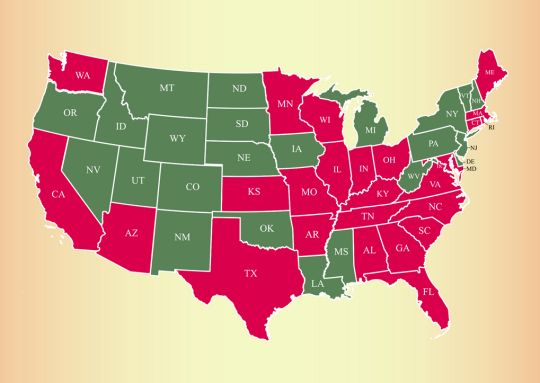Lice populations in the states in red have developed a high level of resistance to some of the most common treatments.
(Image: Kyong Yoon, Ph.D.)
Head lice are freaky enough as-is, but new research has discovered there’s a strain of mutant lice that is resistant to over-the-counter treatments — and they’re found in at least 25 U.S. states. Kyong Sup Yoon, PhD, an assistant professor at Southern Illinois University, presented his findings Tuesday at the American Chemical Society’s National Meeting & Exposition.
Yoon and his team collected lice samples from a large number of populations across 30 states in the U.S. They discovered that 104 out of 109 lice populations had high levels of gene mutations, which make them resistant to pyrethroids.
Pyrethroids are a group of common insecticides that includes permethrin, the active ingredient in the most common head lice treatment products sold at drug stores.
That means if you or your child contracts head lice, there’s a very good chance that the widely available treatments won’t get rid of it.
“It’s kind of alarming,” Yoon tells Yahoo Health. “A ton of products are not working.” It’s worth noting that Yoon’s study is ongoing, meaning these mutant lice may be in more than 25 states.
It doesn’t look promising for the rest of the untested states, based on Yoon’s findings: Michigan is only state so far to have a population of lice that is still largely treatable with common over the counter treatments.
While the news is shocking to most people, he says it isn’t to the research community, which has known for years that pyrethroid-resistant lice were proliferating.
But how did this happen?
It’s much in the same way that antibiotic resistance occurs or can occur, Yoon says. When a product is widely available and even overused, it can create a new problem. Most head lice treatments are available without a prescription, increasing the chances that they will be overused.
In this case, super lice formed a drug resistance that spread as they procreated. “Permethrin is a great chemical because it’s very safe to use on humans, but we lost it because of the lack of resistance management,” says Yoon.
Luckily, this doesn’t mean that you or your child is doomed to a life with head lice if it’s contracted.
Pharmaceutical companies have developed some lice-battling products that don’t contain permethrin, Yoon says, but many are only available with a prescription.
There are also a number of home remedies that are inexpensive and non-toxic, Jake Deutsch, MD, founder and clinical director of New York’s CURE Urgent Care, tells Yahoo Health. Those include using essential oils like tea tree, clove oil, and nutmeg oil, as well as vinegar.
But, if you prefer sticking with a more traditional lice-killing treatment, Sklice, Ovide, and Natroba, are good options, Deutsch says.
If you or your child contracts head lice, don’t use an over-the-counter treatment (unless you live in Michigan), Yoon says: You’re likely wasting your money. Instead, call your doctor.

